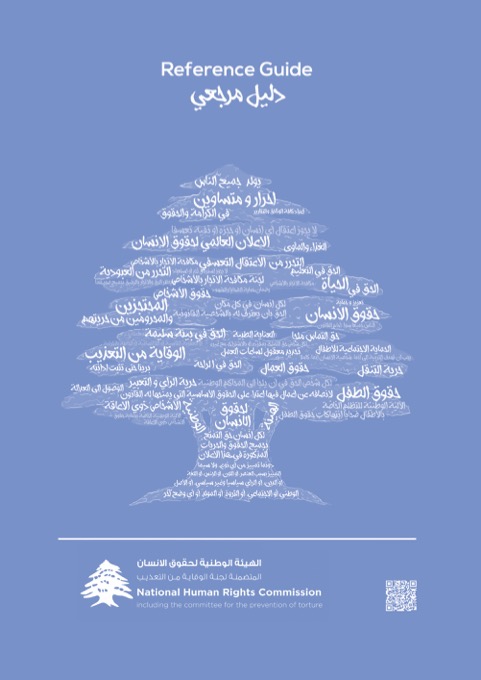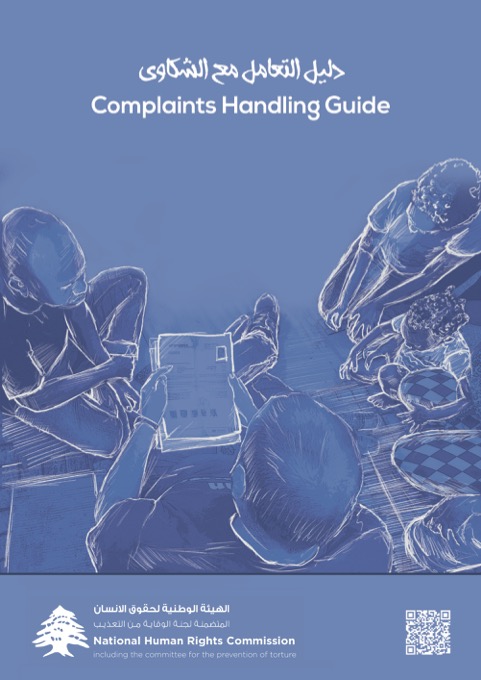The National Human Rights Commission, including the Committee for the Prevention of Torture, has expressed its opinion on the draft law submitted by Parliament on 31 July 2025, proposed by MP Melhem Riachi, which aims to replace pre-trial detention with electronic tagging as an alternative to physical custody.
The Council of Ministers, in its session scheduled for Thursday, 6 November 2025, will discuss this draft law. The discussion takes place in the context of efforts to reform Lebanon’s criminal justice system by adopting alternative measures to imprisonment that contribute to reducing overcrowding in Lebanese prisons and improving the conditions of detainees, while allowing the judiciary to exercise effective oversight through modern electronic means that preserve human dignity and respect legal and human rights safeguards.
Opinion Based on Law No. 62/2016
Pursuant to Article 15 of Law No. 62/2016, which established the Commission and empowers it to issue opinions on draft laws and legislative proposals related to human rights, the Commission prepared a detailed opinion on the proposal based on a methodology that respects international standards and United Nations principles, particularly:
-
The Nelson Mandela Rules (2015), which affirm that pre-trial detention should be exceptional and that states should adopt non-custodial measures whenever possible.
-
The Méndez Principles (2023) on the use of law enforcement equipment, which stipulate that all measures restricting liberty must be subject to judicial oversight and respect human dignity.
-
The Istanbul Protocol (2022, revised edition), which links the prevention of torture with criminal justice reform and the safeguarding of detainees’ rights.
-
The Bangkok Rules (2010) on the treatment of women prisoners and non-custodial measures for women offenders.
Commission’s View: A Reform Measure Provided Human Rights Guarantees Are Ensured
The Commission considers the adoption of electronic tagging a qualitative step forward in Lebanon’s criminal justice system, provided it is implemented within a comprehensive legal framework that ensures judicial supervision and the protection of fundamental rights.
It emphasized that the decision to impose electronic tagging must be judicially reasoned, time-bound, and subject to appeal, thereby strengthening the principle of a fair trial enshrined in the Lebanese Constitution and the International Covenant on Civil and Political Rights.
The Commission also stressed the importance of protecting the right to privacy, by regulating the collection, monitoring, storage, and use of personal data in accordance with Law No. 81/2018 on electronic transactions and personal data protection, ensuring that electronic tagging does not become a tool for arbitrary surveillance or intrusion into private life.
The Commission further noted that the success of this measure requires independent oversight, such as that of the National Human Rights Commission, to ensure compliance with human rights standards during implementation. It also called for psychosocial support programs for beneficiaries to facilitate their reintegration and prevent social stigma.
Practical Recommendations
The Commission made the following recommendations:
-
Expressing its preliminary support for the adoption of electronic tagging as an alternative to pre-trial detention, as it represents a reform measure consistent with Lebanon’s international commitments.
-
Calling on the Ministry of Justice to conduct a comprehensive study defining the required technical and legal infrastructure to ensure effective and secure implementation.
-
Issuing an implementing decree simultaneously with the adoption of the law, specifying mechanisms for judicial oversight and guarantees for privacy and human dignity.
-
Ensuring non-discrimination in the application of this measure, with clear criteria for the offenses eligible under this system, while excluding serious and violent crimes.
The National Human Rights Commission, including the Committee for the Prevention of Torture, affirms that the electronic tagging project, if adopted within a human-rights-based framework, would constitute a qualitative transformation toward a more humane and effective justice system in Lebanon. It reflects the State’s commitment to the rule of law and respect for human dignity, and marks a shift from a purely punitive approach to one of restorative justice, balancing public safety with the protection of individual rights.
هذه المقالة متاحة أيضًا بـ: العربية (Arabic)



